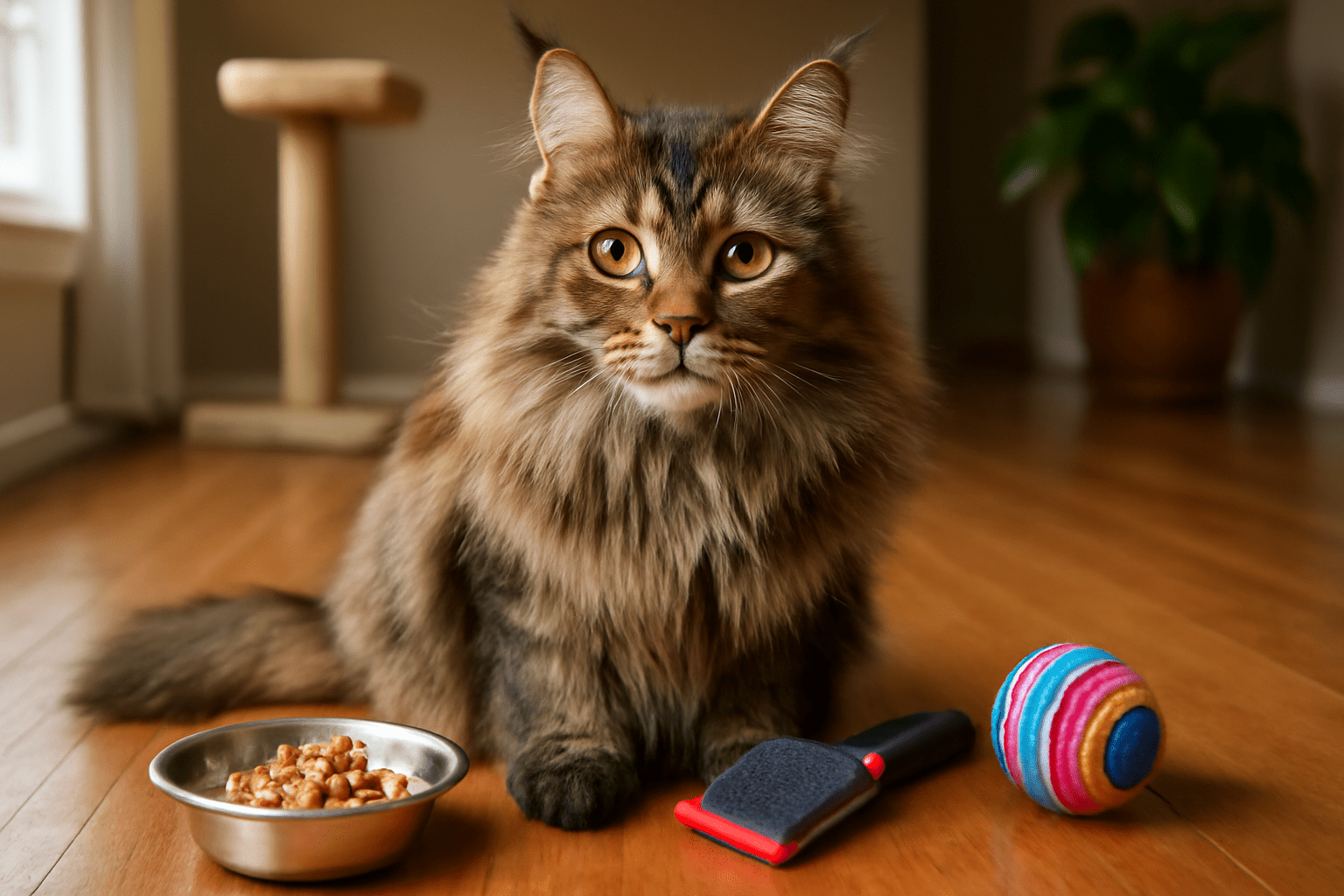
Female Maine Coon Cat Care: Essential Tips for Raising a Healthy, Happy Feline
If you’ve recently welcomed a female Maine Coon cat into your home, you’re in for a rewarding experience! 
In this guide, we’ll share the essential tips for raising a healthy, happy female Maine Coon cat, from grooming to diet and everything in between. Whether you’re a first-time cat owner or an experienced pet parent, you’ll find practical, expert-backed advice that addresses your cat’s specific needs. Ready to give your Maine Coon the best life possible? Keep reading for actionable tips that will make a real difference!
Table of Contents
ToggleOverview: What You’ll Learn
In this article, we’ll guide you through the essential steps to provide the best care for your female Maine Coon cat. Whether you’re a first-time cat owner or a seasoned pet parent, we’ve got you covered with practical tips that will help your feline thrive. Here’s a quick overview of what you’ll learn:
- Grooming Tips for Your Female Maine Coon Cat
Learn the right tools and techniques to keep your Maine Coon’s luxurious fur in perfect condition, preventing matting and hairballs. - Optimal Nutrition and Diet
Discover what to feed your female Maine Coon cat for long-term health, from high-quality proteins to essential nutrients for a shiny coat and strong bones. - Health Concerns and Preventative Care
Understand common health issues in Maine Coons, such as heart disease and arthritis, and how to spot early signs to keep your cat in top shape. - Exercise and Mental Stimulation Needs
Maine Coons are highly intelligent and active—find out how to provide them with physical exercise and mental challenges to keep them happy and healthy. - Creating a Safe, Comfortable Environment
Tips on setting up a cat-friendly home with safe spaces and engaging activities that cater to your female Maine Coon’s natural instincts.
By the end of this guide, you’ll be well-equipped to provide your female Maine Coon with the love, care, and attention she deserves, ensuring she remains happy and healthy for years to come. Let’s dive in and make your Maine Coon’s life as wonderful as she is!
The Unique Traits of Female Maine Coon Cats
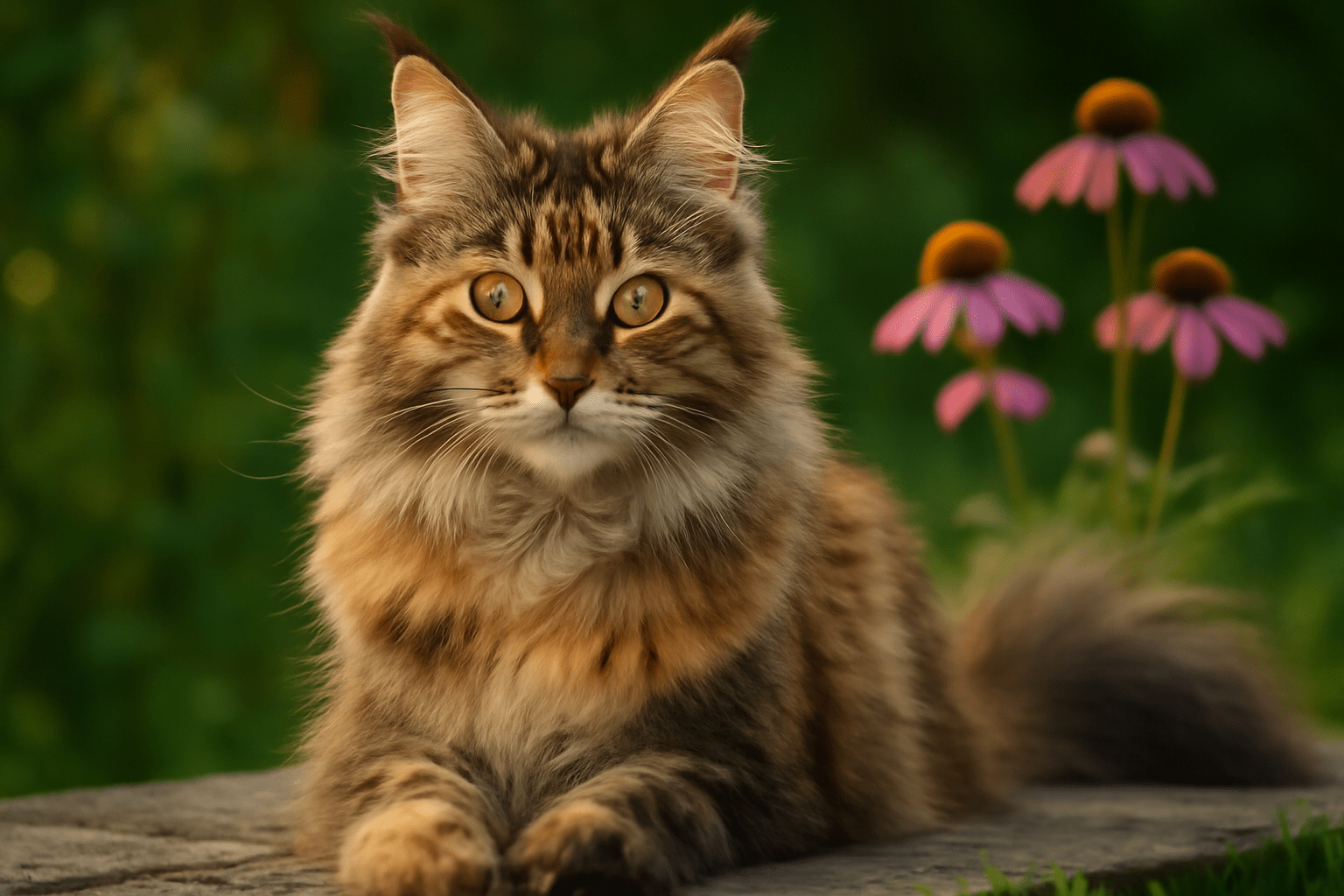
Female Maine Coon cats are a distinct breed, known for their charming personalities, impressive size, and beautiful coats. Understanding their unique traits is key to providing the best care possible. Here’s what sets them apart:
1. Size and Build 
Although female Maine Coons are generally smaller than their male counterparts, they still possess a robust, muscular build. On average, a female Maine Coon can weigh between 8-12 pounds, with a length of about 19-25 inches. Their sturdy frame and large paws give them a regal appearance, but don’t let their size fool you – they are gentle giants!
Tip: Ensure you provide enough space for your female Maine Coon to move freely and comfortably. Her large size means she’ll appreciate having room to stretch out and climb.
2. Coat and Grooming Needs 
Maine Coons are known for their long, thick, and silky fur, and females are no exception. This luxurious coat requires regular maintenance to keep it free from mats and tangles. Female Maine Coons also have a dense undercoat, which can be prone to matting, especially if they are not groomed frequently.
Tip: Brush your female Maine Coon at least 2-3 times a week to prevent mats and tangles, using a wide-toothed comb or a slicker brush. This will help keep her coat shiny and healthy while reducing shedding.
3. Gentle and Affectionate Nature 
Female Maine Coons are often known for their calm and affectionate personalities. They tend to bond closely with their human family members and enjoy being involved in daily activities. Despite their independent streak, they love to spend time with their owners and are known to “talk” to them with soft chirps and trills.
Tip: Make sure you spend quality time with your female Maine Coon, engaging in interactive play, grooming sessions, and cuddling. This will strengthen your bond and keep her emotionally fulfilled.
4. Intelligence and Curiosity 
Maine Coons are one of the most intelligent cat breeds, and females are no different. They are quick learners and can often be trained to perform tricks or use a litter box with ease. Their natural curiosity also means they are highly interested in their surroundings and love exploring new environments.
Tip: Provide mental stimulation through puzzle toys, interactive feeders, and new challenges. This will prevent boredom and help your female Maine Coon stay sharp and happy.
5. Playful but Independent 
Although female Maine Coons are affectionate, they also have an independent streak. They enjoy playtime but are equally content spending time alone, especially if they have a cozy space to retreat to. This balance of independence and playfulness makes them a great companion for families, singles, or those with busy lifestyles.
Tip: Respect her need for personal space, and ensure she has a quiet area where she can relax undisturbed. At the same time, engage her in regular play sessions to keep her active and entertained.
By understanding these unique traits of female Maine Coon cats, you’ll be better equipped to provide the care they need to thrive. These beautiful cats bring joy and warmth to any home, and with the right approach, you’ll foster a strong, loving relationship with your furry companion.
Grooming: Essential Care for Their Beautiful Fur
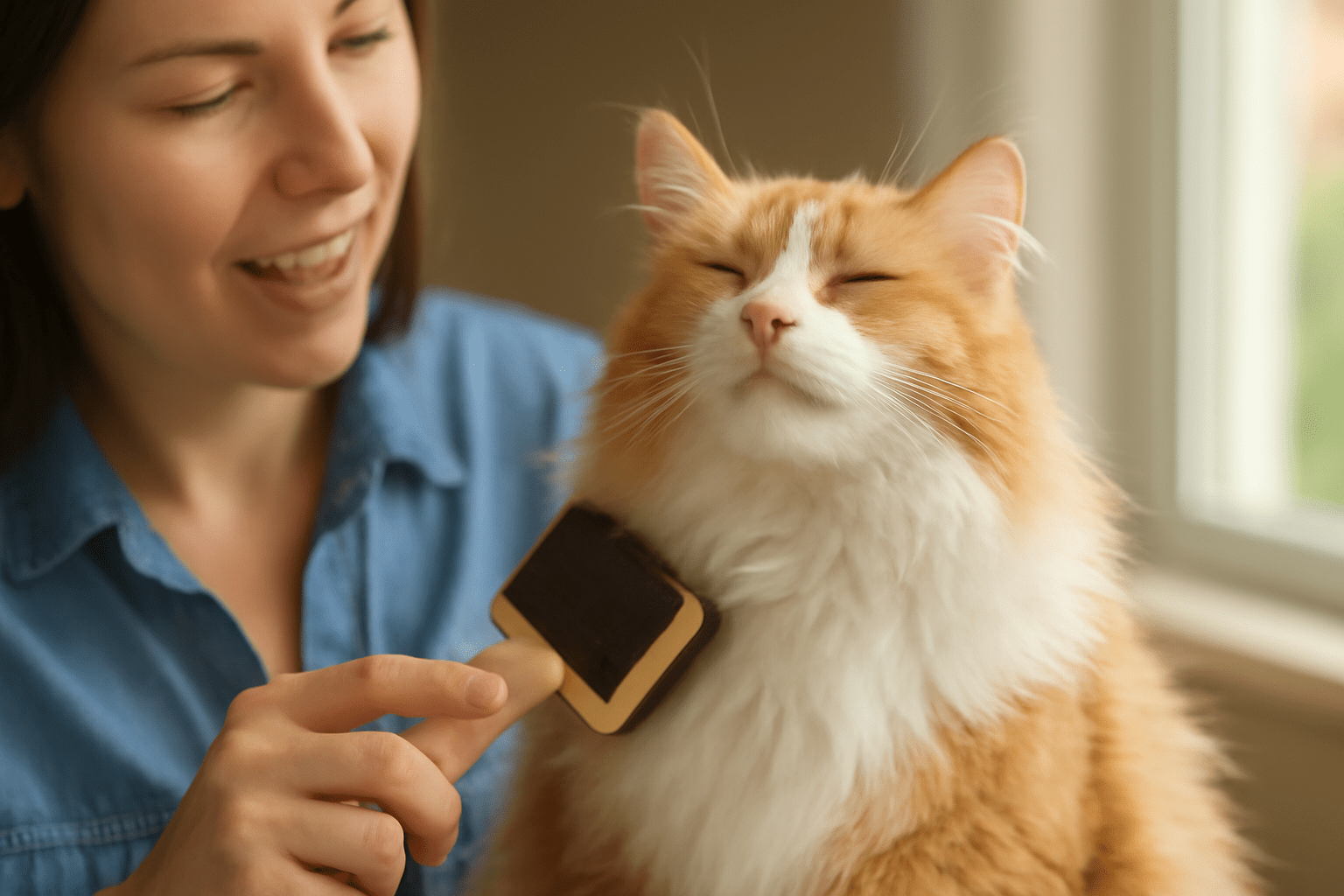
A female Maine Coon cat is known for her stunning, long coat, which is one of the breed’s most defining features. However, maintaining this luxurious fur requires regular grooming to keep it shiny, healthy, and tangle-free. Let’s dive into the essential grooming practices that will keep your female Maine Coon looking her best.
1. Why Grooming is Crucial for Female Maine Coon Cats 
Grooming is more than just about aesthetics – it plays a key role in your female Maine Coon cat’s overall health. Their thick, double-layered coat is prone to matting, especially during shedding seasons. Regular grooming helps prevent mats, reduces shedding, and supports skin health. It also provides an opportunity to check for signs of skin conditions, parasites, or other health issues.
Tip: Aim to groom your female Maine Coon 2-3 times per week, but more frequent grooming may be necessary during heavy shedding seasons (spring and fall).
2. Essential Tools for Grooming Your Female Maine Coon 
To make grooming easier and more effective, you’ll need the right tools. Here are the must-have grooming tools for your Maine Coon:
- Slicker Brush: Helps remove loose fur and detangle mats, especially in their undercoat.
- Wide-toothed Comb: Ideal for detangling large mats without causing discomfort.
- De-shedding Tool: This is useful during shedding seasons to reduce the amount of fur that ends up around the house.
- Nail Clippers: Keep your Maine Coon’s claws trimmed to prevent scratching accidents.
Tip: Invest in high-quality grooming tools specifically designed for long-haired cats, as they will make the process smoother and more comfortable for both you and your cat.
3. How to Groom Your Female Maine Coon Cat 
Proper grooming involves more than just brushing. Here’s a simple, step-by-step guide:
- Start with a Calm Environment: Make sure your cat is comfortable and calm before starting. Grooming should be a relaxing experience, not a stressful one. You might want to try grooming after playtime or when your cat is already relaxed.
- Brush the Coat Gently: Begin by brushing your female Maine Coon’s coat using a slicker brush. Start from the back and work your way down to the tail. Be gentle around sensitive areas like the stomach and chest.
- Focus on the Undercoat: The thick undercoat is where mats often form. Use a wide-toothed comb to carefully work through any tangles. If you find a knot, gently separate it with your fingers before brushing it out.
- Trim the Nails: Keep your Maine Coon’s claws trimmed to avoid overgrowth and potential injury. Only trim the sharp tips, being cautious not to cut too close to the quick.
- Check for Other Grooming Needs: While grooming, check for any signs of skin irritation, ticks, or fleas. Also, ensure your cat’s ears, teeth, and eyes are clean.
Tip: If your female Maine Coon has a tendency to get mats, use a detangling spray to make the process easier. You can find sprays specifically made for long-haired cats.
4. Bathing Your Female Maine Coon Cat 
While Maine Coons are generally clean cats, occasional baths may be necessary, especially if they get into something sticky or smelly. However, avoid over-bathing as it can dry out their skin.
- Frequency: Only bathe your female Maine Coon when needed (typically every 3-6 months).
- How to Bathe: Use a cat-specific shampoo that is gentle on her skin. Always rinse thoroughly and dry her coat with a soft towel. Never use human shampoo, as it can irritate their skin.
Tip: If your female Maine Coon is not used to baths, start with a simple waterless shampoo or a damp cloth to clean her before moving on to full baths.
5. Dealing with Shedding 
Maine Coons shed year-round, but their shedding increases during seasonal changes. Regular grooming helps control shedding, but you can also manage it by:
- Using a De-shedding Brush: These brushes are designed to remove loose fur from the undercoat, which reduces shedding around your home.
- Feeding a High-Quality Diet: A nutritious diet rich in omega-3 fatty acids promotes healthy skin and a shiny coat, which can help reduce shedding.
Tip: Keep a lint roller handy around the house to quickly remove fur from furniture and clothes.
6. Signs Your Female Maine Coon Needs a Professional Groomer 
While regular at-home grooming is essential, some Maine Coons may require professional grooming for certain issues, such as severe matting, excess shedding, or if they are particularly anxious during grooming sessions.
Tip: If your Maine Coon’s fur becomes severely matted or tangled despite your efforts, it’s best to consult a professional groomer who is experienced with long-haired cats.
By following these grooming tips, you can ensure your female Maine Coon cat’s coat stays beautiful and healthy while also supporting her overall well-being. Regular grooming not only keeps her looking fabulous but also helps create a stronger bond between you and your feline friend.
Diet and Nutrition: Keeping Your Female Maine Coon Healthy
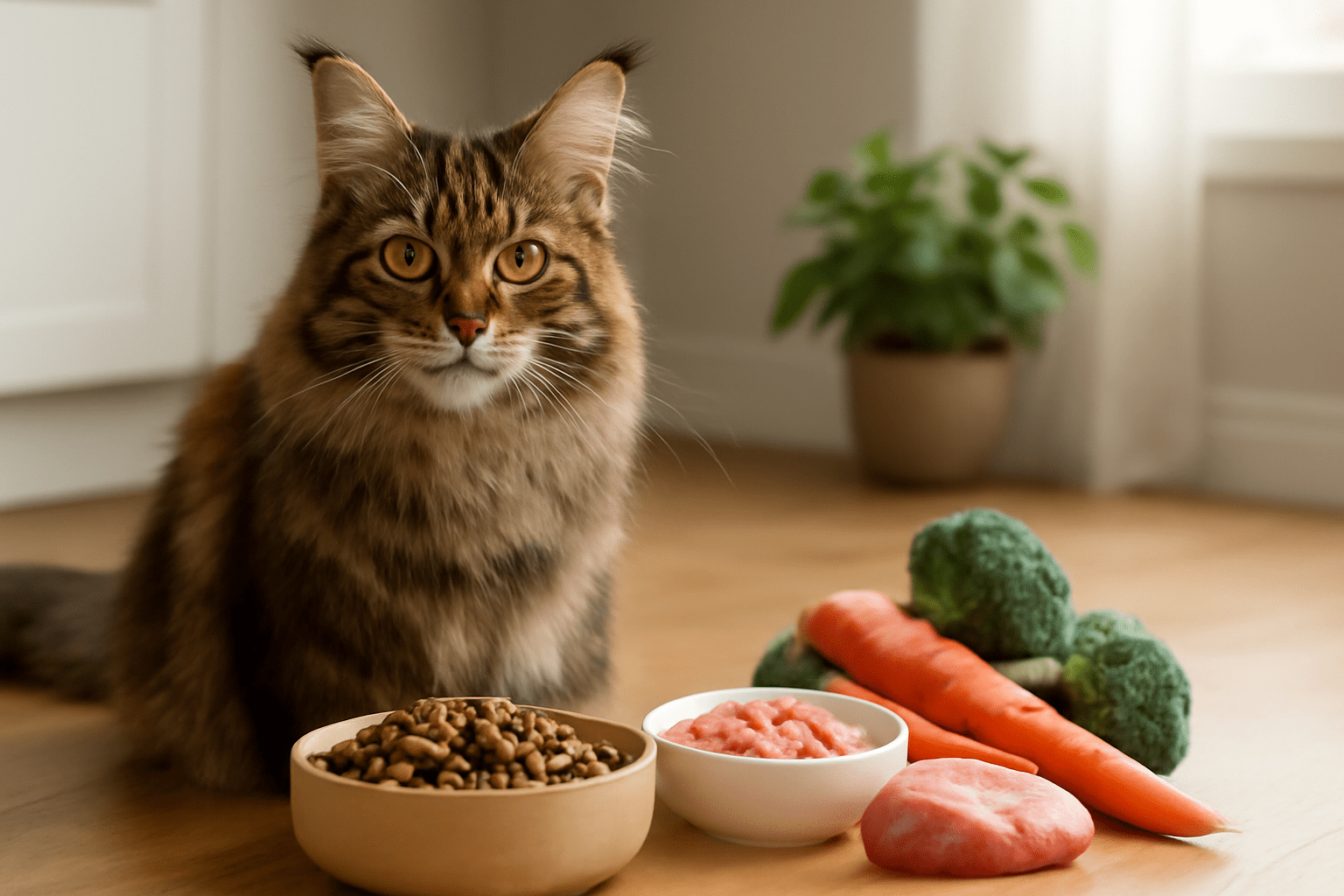
A balanced and nutritious diet is essential for maintaining the health and well-being of your female Maine Coon cat. As one of the largest domestic cat breeds, they have specific dietary needs to support their large size, active lifestyle, and beautiful coat. In this section, we’ll dive into the key aspects of feeding your female Maine Coon, ensuring she gets the nutrients necessary for a long, healthy life.
1. Why Diet is Crucial for Female Maine Coon Cats 
Female Maine Coon cats require a high-quality diet to fuel their large bodies, support their energy levels, and maintain their sleek coats. Their size and active nature mean they need more calories than smaller cat breeds, along with the right balance of proteins, fats, vitamins, and minerals. Proper nutrition also helps prevent obesity, a common concern in Maine Coons, and reduces the risk of health issues like heart disease and joint problems.
Tip: Feed your female Maine Coon a diet designed for large breeds, ensuring that her nutritional needs are met to keep her healthy and happy.
2. Key Nutrients for a Healthy Female Maine Coon 
When selecting food for your female Maine Coon cat, focus on high-quality, nutrient-dense ingredients. The key nutrients that should be included in her diet are:
- Protein: Maine Coons are active and muscular, so they need a diet rich in animal-based proteins like chicken, turkey, or fish. Protein supports muscle growth and tissue repair, which is vital for their large bodies.
- Fats: Healthy fats, including omega-3 and omega-6 fatty acids, help maintain skin health, support brain function, and give your Maine Coon her soft, shiny coat. Fish oil and flaxseed are excellent sources of these healthy fats.
- Carbohydrates: While cats are obligate carnivores, small amounts of digestible carbohydrates (like rice or sweet potatoes) can be beneficial for energy and digestive health.
- Vitamins and Minerals: Make sure your female Maine Coon’s food contains essential vitamins and minerals such as taurine, vitamin E, and calcium. These nutrients are vital for heart health, vision, and bone strength.
Tip: Look for premium cat foods with real meat as the first ingredient and avoid those with artificial additives or fillers like corn and soy.
3. Wet Food vs. Dry Food: Which is Best for Your Female Maine Coon? 

When deciding between wet and dry food, there are pros and cons to both options. Here’s what to consider:
- Wet Food: Offers higher moisture content, which is great for keeping your female Maine Coon hydrated, especially if she doesn’t drink much water on her own. It’s also easier to digest and typically more flavorful, encouraging cats with picky appetites to eat.
- Dry Food: Convenient and helps promote dental health by reducing plaque and tartar buildup. However, it contains less moisture, which could lead to dehydration if your Maine Coon isn’t drinking enough water.
Tip: A mix of both wet and dry food is often recommended to balance hydration and dental health. Make sure fresh water is always available, especially if you primarily feed dry food.
4. Portion Control: Preventing Obesity in Female Maine Coon Cats 
Obesity is a common problem in Maine Coons, as their large size and love for food can sometimes lead to overeating. Maintaining a healthy weight is crucial for your female Maine Coon’s longevity and overall health.
- Portion Size: Follow the feeding guidelines on the cat food packaging, but adjust portions based on your cat’s activity level. Active cats require more calories, while less active cats need fewer.
- Meal Frequency: Instead of free-feeding (leaving food out all day), try feeding your female Maine Coon 2-3 measured meals per day. This helps regulate her weight and prevents overeating.
Tip: Monitor her body condition regularly. If your cat’s waistline becomes difficult to see or she starts gaining weight, adjust her portions or switch to a lighter formula.
5. Treats: How to Include Them Wisely 
Treats can be a great way to bond with your female Maine Coon and reward her, but they should be given in moderation. Overfeeding treats can lead to unnecessary weight gain and nutrient imbalances.
- Healthy Treats: Choose treats that are low in calories and high in protein. Freeze-dried meat treats or small pieces of cooked chicken are great options.
- Avoid Human Food: Never give your female Maine Coon foods that are toxic to cats, like chocolate, onions, or grapes. Always check if a treat is safe for cats before offering it.
Tip: Use treats as a training tool or for positive reinforcement, but make sure they don’t make up more than 10% of her daily calorie intake.
6. Hydration: The Overlooked Factor in Nutrition 
Proper hydration is essential for your female Maine Coon’s health, especially for her kidneys and urinary tract. Cats, in general, are not great at drinking water, so it’s important to encourage hydration.
- Wet Food: Incorporating wet food into her diet can help boost water intake.
- Water Fountains: Many Maine Coons prefer running water, so a cat water fountain can encourage your female Maine Coon to drink more. You can buy different wonderful water fountains from here.
- Fresh Water: Ensure clean, fresh water is available at all times.
Tip: Monitor her water intake and ensure that she’s drinking enough daily. If your female Maine Coon is consistently avoiding water, consider increasing her wet food portion or consulting a vet for advice.
By providing your female Maine Coon with the right balance of nutrients, a suitable feeding schedule, and healthy treats, you’ll ensure she remains in excellent health. A well-fed Maine Coon is a happy, active cat, and with these diet tips, you can help her thrive well into her senior years.
Health and Wellness: How to Keep Your Female Maine Coon in Top Shape
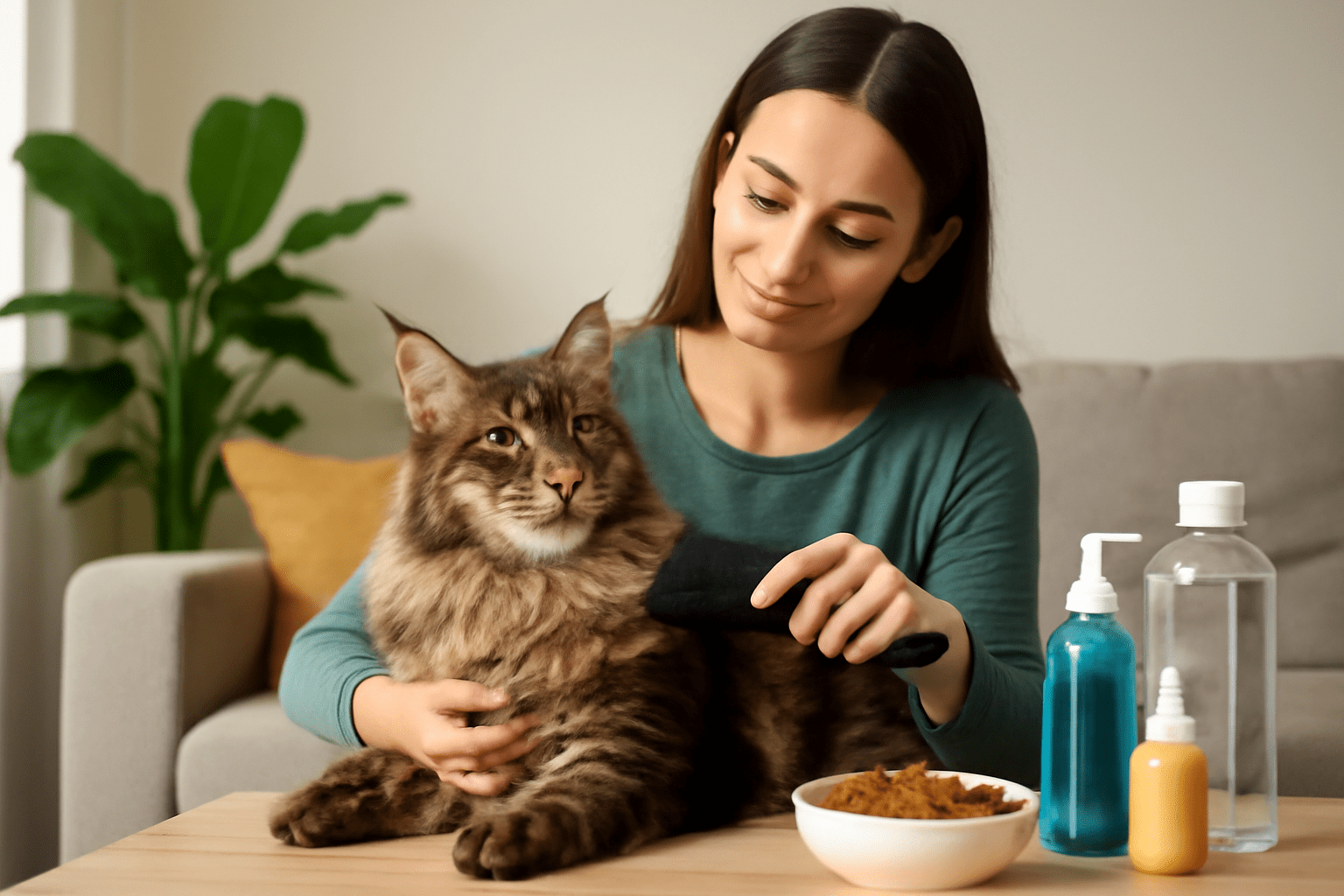
Ensuring your female Maine Coon cat remains in optimal health goes beyond just a balanced diet and regular grooming. This section will guide you through essential health care practices to keep your feline happy, healthy, and thriving. From routine check-ups to monitoring for specific health issues, here’s everything you need to know.
1. Routine Veterinary Care: The Foundation of Good Health 
Regular veterinary check-ups are crucial for your female Maine Coon’s well-being. As a breed, Maine Coons are prone to certain hereditary health conditions, so early detection can be the key to managing potential problems.
- Annual Check-ups: Schedule yearly vet visits for vaccinations, health screenings, and general check-ups. This helps ensure your Maine Coon stays up-to-date on her health needs.
- Dental Health: Dental issues, such as gingivitis or periodontal disease, are common in cats. Ensure regular dental cleanings (at home or by a vet) to keep her teeth healthy.
- Spaying/Neutering: If your female Maine Coon hasn’t been spayed yet, consider doing so. Spaying can prevent unwanted pregnancies and lower the risk of certain health problems, like uterine infections and breast cancer.
Tip: Keep a health log of your cat’s vet visits, vaccinations, and treatments to stay organized and informed about her health status.
2. Common Health Issues in Female Maine Coon Cats 
While Maine Coons are generally healthy cats, they are prone to certain conditions that you should be aware of as a responsible cat owner.
- Hypertrophic Cardiomyopathy (HCM): This is a common heart disease in Maine Coons, where the heart muscle becomes abnormally thick. Regular veterinary check-ups can help monitor heart health.
- Hip Dysplasia: Like many large breeds, Maine Coons are susceptible to hip dysplasia, a condition where the hip joint doesn’t fit properly into the hip socket. If left untreated, it can lead to arthritis and joint pain.
- Polycystic Kidney Disease (PKD): Maine Coons are prone to kidney problems, and PKD is one of the more common hereditary conditions. Early detection through blood work and regular kidney health checks can help manage the condition.
Tip: Talk to your vet about screening for these conditions during routine check-ups to catch them early and take preventive measures.
3. Signs of Illness to Watch For 
As a responsible cat owner, it’s essential to know the warning signs of illness so you can address them promptly. Keep an eye out for:
- Changes in Appetite: Loss of appetite or excessive eating can signal digestive or health issues.
- Lethargy or Unusual Behavior: If your female Maine Coon becomes unusually quiet or hides more often, it could be a sign of discomfort or illness.
- Excessive Grooming: While grooming is normal, excessive licking or biting at specific areas could indicate skin irritation, pain, or stress.
- Respiratory Issues: Coughing, sneezing, or labored breathing should always be checked by a vet.
Tip: If you notice any of these changes, don’t wait. Early detection can prevent further complications and ensure your Maine Coon receives the care she needs.
4. Maintaining Joint Health 
As a large breed, your female Maine Coon will benefit from proactive care to maintain healthy joints, especially as she ages.
- Weight Management: Keeping her at a healthy weight will reduce the strain on her joints and prevent obesity-related issues, such as arthritis.
- Joint Supplements: Consider adding joint supplements with glucosamine and chondroitin to her diet to support joint health and mobility, particularly if she shows signs of arthritis or hip dysplasia.
- Exercise: Encourage gentle, low-impact exercises like short play sessions and climbing activities to maintain her muscle mass and joint mobility.
Tip: If your Maine Coon shows signs of stiffness or limping, consult your vet to determine the best course of action for joint care.
5. Monitoring Weight and Physical Condition 
Maine Coons, like many larger cats, are prone to weight gain, which can exacerbate health issues like joint pain and heart disease. Regularly monitor her weight and overall physical condition to ensure she’s staying healthy.
- Ideal Weight: Female Maine Coons typically weigh between 8-12 pounds, but some may naturally be a bit heavier. Work with your vet to determine your cat’s ideal weight based on her frame and activity level.
- Body Condition Scoring: Learn how to assess her body condition score (BCS). Ideally, you should be able to feel her ribs with a slight layer of fat, and she should have a noticeable waistline when viewed from above.
Tip: If your female Maine Coon is gaining weight, adjust her food intake or increase her physical activity to bring her back to a healthy weight.
6. Mental Wellness: Keeping Your Maine Coon Mentally Stimulated 
Maine Coons are intelligent and curious cats who thrive on mental stimulation. Boredom can lead to behavioral issues, including excessive grooming or destructive behavior.
- Interactive Play: Provide toys like feather wands, puzzle feeders, and laser pointers to keep her entertained and mentally engaged.
- Training: Maine Coons are highly trainable and enjoy learning new tricks or commands. Regular training sessions can be a fun way to bond while keeping her mind sharp.
Tip: Rotate toys regularly to keep things exciting and offer new challenges that cater to her problem-solving skills.
By focusing on regular vet visits, staying vigilant for health issues, and providing a balanced approach to physical and mental wellness, you can help your female Maine Coon live a long, healthy, and happy life. Monitoring her health closely and addressing any issues early will allow you to enjoy many years of companionship with your majestic feline.
Exercise and Mental Stimulation: Keeping Your Female Maine Coon Active
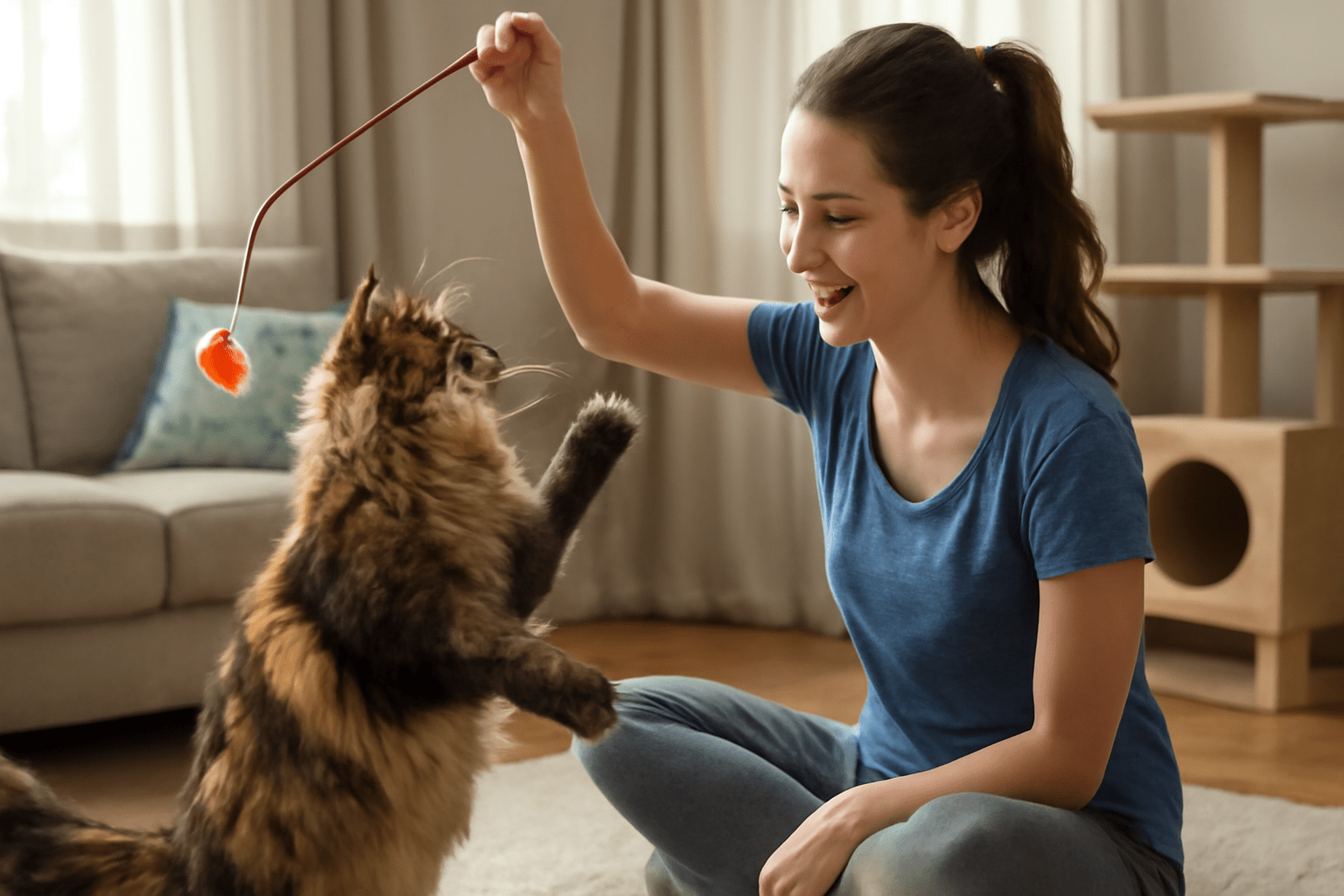
A female Maine Coon cat is an intelligent, playful, and energetic breed, so it’s crucial to provide her with the right amount of physical exercise and mental stimulation. Regular activity not only keeps her in good shape but also helps prevent behavioral issues like boredom and stress. In this section, we’ll explore effective ways to keep your female Maine Coon both physically and mentally engaged.
1. Why Exercise is Important for Your Female Maine Coon Cat 
Maine Coons are one of the most active cat breeds, and they need regular exercise to maintain a healthy weight, support joint health, and burn off excess energy. Without adequate exercise, your female Maine Coon may become overweight, lethargic, or develop behavioral problems.
- Joint Health: Regular activity helps maintain muscle tone and supports healthy joints, reducing the risk of conditions like arthritis.
- Weight Control: Exercise helps prevent obesity, which is a common issue in larger cats like Maine Coons.
Tip: Make sure your female Maine Coon has opportunities for exercise every day. Even short, engaging sessions can make a big difference in her overall well-being.
2. Types of Physical Exercise for Your Female Maine Coon 
Here are some great ways to help your female Maine Coon stay active:
- Interactive Play: Use toys like feather wands, laser pointers, or toy mice to engage her in playful chase sessions. These activities mimic hunting behaviors and are both fun and stimulating for your cat.
- Climbing and Exploration: Maine Coons love to climb. Install a cat tree or shelves at different heights to encourage climbing, which not only provides exercise but also satisfies her natural curiosity and need for vertical space.
- Fetch and Chase: Some Maine Coons enjoy playing fetch. Try tossing a small ball or toy and see if your female Maine Coon enjoys retrieving it. It’s a great way to get her moving!
Tip: Use a variety of toys to keep playtime interesting and avoid letting your cat get bored with the same routine.
3. Mental Stimulation: Keeping Her Mind Sharp 
Maine Coons are incredibly intelligent cats who thrive when given mental challenges. Keeping your female Maine Coon mentally engaged is just as important as physical exercise to ensure her happiness.
- Puzzle Toys: Invest in puzzle feeders or treat-dispensing toys. These toys challenge your cat to think and problem-solve, making mealtime more stimulating.
- Training Sessions: Maine Coons can be trained to do tricks or follow commands. Use positive reinforcement to teach her new skills like “sit,” “high five,” or “come.” Not only will this improve her behavior, but it’s also a fun and rewarding bonding activity.
- Environmental Enrichment: Provide different types of environmental enrichment, such as new scratching posts, cardboard boxes, or even an outdoor enclosure (catio). Changing up her environment keeps things exciting and mentally stimulating.
Tip: Regularly rotate toys to keep her engaged and interested. Avoid overloading her with too many at once, as this can lead to overstimulation.
4. Playtime Routine: How Much Exercise Does Your Female Maine Coon Need? 
While the amount of exercise needed can vary from cat to cat, female Maine Coons typically require 30-60 minutes of physical activity a day, broken up into shorter play sessions.
- Interactive Play: Engage in at least two play sessions a day. Each session can last 10-15 minutes.
- Solo Exploration: Allow your cat to have some free time to explore her environment. Make sure she has access to climbing areas and places to hide and relax.
Tip: Schedule regular playtimes throughout the day, especially in the morning and evening, to mimic her natural hunting schedule.
5. Signs Your Female Maine Coon Isn’t Getting Enough Exercise 
If your female Maine Coon isn’t getting enough physical or mental stimulation, you may notice certain signs:
- Weight Gain: Lack of exercise can lead to obesity, so monitor her weight regularly.
- Destructive Behavior: Boredom can lead to unwanted behavior, like scratching furniture, excessive meowing, or chewing on household items.
- Lethargy: Cats that don’t get enough exercise may appear lazy, lethargic, or even more irritable.
Tip: If you notice any of these signs, it’s time to step up her exercise routine. A few extra play sessions each day can make a big difference.
By providing your female Maine Coon with a combination of physical activity and mental stimulation, you’ll help her stay happy, healthy, and well-adjusted. The key is consistency and variety—engage her in different activities to keep things fresh and fun. With regular exercise and mental challenges, you’ll have a happy, active, and content Maine Coon who will thrive in her environment.
Creating a Safe and Loving Home Environment
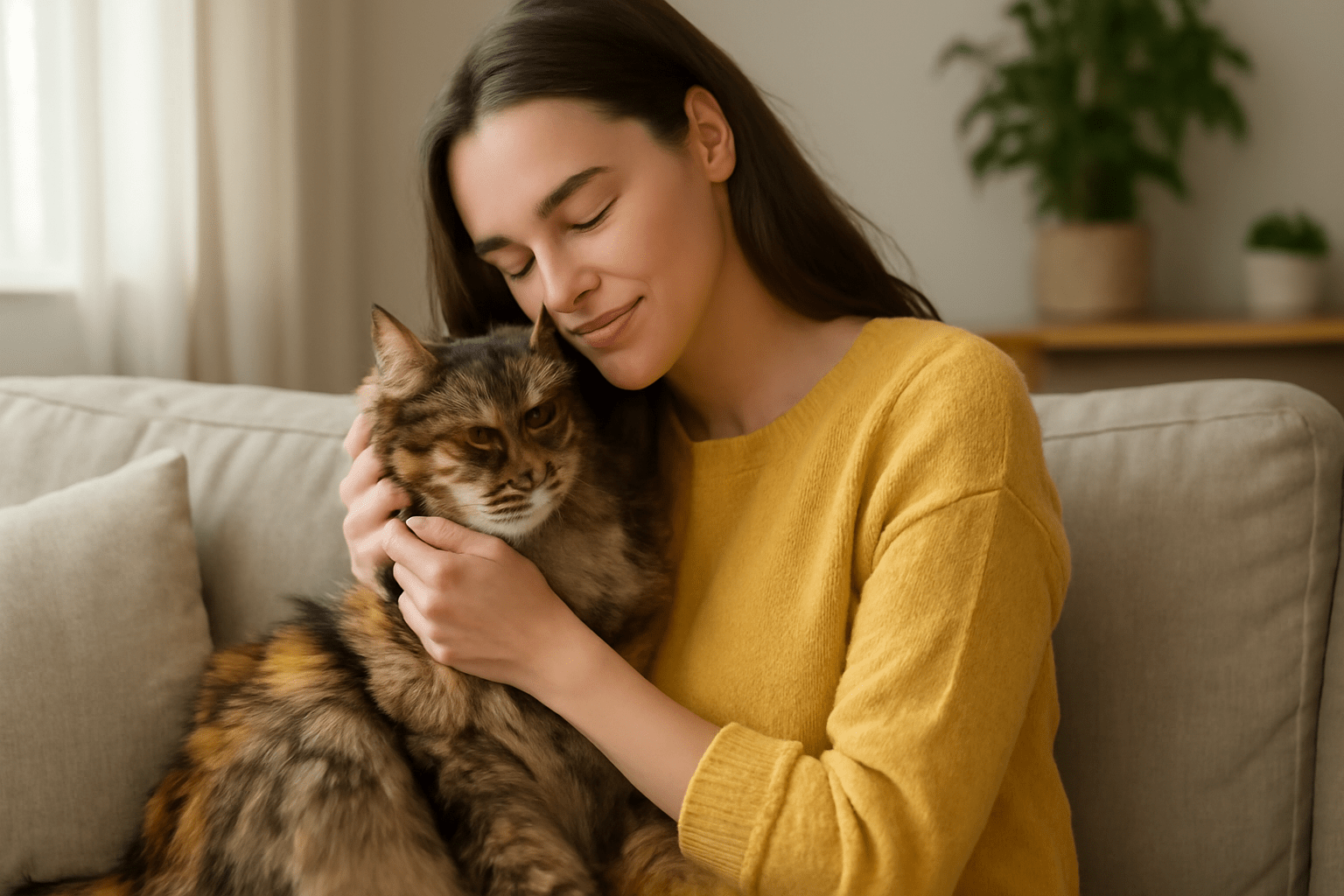
Your female Maine Coon cat’s well-being is greatly influenced by her living environment. A safe, secure, and loving home not only promotes physical health but also supports her emotional needs. In this section, we’ll explore practical steps to create an environment where your female Maine Coon can thrive.
1. Providing Safe Spaces for Your Female Maine Coon Cat 
Maine Coons are naturally curious cats, and they love to explore their surroundings. However, it’s essential to provide spaces where your female Maine Coon can retreat when she wants some quiet time or a break from the hustle and bustle.
- Cat Trees and Shelves: Maine Coons enjoy being up high. Install a cat tree or shelves at different levels to give her the vertical space she craves. This not only caters to her climbing instincts but also provides a safe, elevated space to relax and observe her surroundings.
- Private Hideaways: Provide cozy hideaways or cat caves where your female Maine Coon can curl up for naps or hide when she feels stressed. A quiet spot away from noise or other pets will help her feel secure and comfortable.
Tip: Ensure these areas are easily accessible and provide soft bedding for her comfort. Cats feel more at ease when they have a private space to retreat to whenever they choose.
2. Creating a Stimulating Environment for Exploration 
Mental stimulation is just as important as physical space for your female Maine Coon’s overall health. Maine Coons are highly intelligent, and a boring, monotonous environment can lead to frustration or undesirable behaviors. Here’s how to make her environment more enriching:
- Interactive Toys: Use puzzle feeders, treat-dispensing toys, or interactive gadgets to keep her engaged and mentally stimulated. These toys encourage problem-solving and mimic natural hunting behaviors, keeping her sharp.
- Window Perches: Maine Coons love watching the world outside. If possible, set up a safe perch near a window so she can observe birds, squirrels, or people passing by. This provides entertainment and mental stimulation without leaving the safety of her home.
Tip: Regularly rotate the toys and activities to keep her interested. Offering different types of toys prevents boredom and promotes mental health.
3. Safety Measures for Your Female Maine Coon Cat 
To ensure your female Maine Coon stays safe, there are a few measures you can take, especially if you live in an area where she might encounter dangers, such as traffic or other animals.
- Secure Windows and Balconies: If your Maine Coon spends time near open windows or balconies, make sure they are properly secured. Maine Coons are agile climbers and may accidentally fall if they get too close to the edge.
- Cat-Proofing Your Home: Make sure harmful items, such as toxic plants, small objects she could swallow, and chemicals, are kept out of her reach. Cats are naturally curious, so ensuring a safe space is essential for her health.
Tip: Consider using window screens or cat enclosures to give your Maine Coon safe access to the outdoors without the risk of escaping or getting hurt.
4. Fostering a Loving Bond 
Maine Coons are known for their affectionate nature, and building a strong, trusting relationship with your female Maine Coon will enhance her emotional well-being.
- Daily Interaction: Spend time each day bonding with your cat through play, petting, and cuddling. Maine Coons appreciate their owner’s attention and are known to follow their humans around the house.
- Respect Her Boundaries: While Maine Coons enjoy affection, they also value their independence. Always respect your cat’s boundaries and avoid overwhelming her with excessive attention. Let her come to you when she’s ready for companionship.
Tip: Pay attention to her body language and vocalizations. If she’s purring and leaning in, she’s enjoying your attention, but if she’s swatting or backing away, give her space.
5. Ensuring a Pet-Friendly Household 
If you have other pets in the house, it’s essential to ensure that your female Maine Coon feels comfortable and secure in her environment. Cats can be territorial, and the introduction of new pets may lead to stress or conflicts.
- Gradual Introductions: If you’re introducing a new pet, such as another cat or dog, do so gradually. Allow them to get used to each other’s scent first before allowing them to interact face-to-face.
- Separate Spaces for Each Pet: Ensure that each pet has its own space, including separate feeding areas, resting spots, and litter boxes. This will help prevent territorial disputes and promote a peaceful household.
Tip: Monitor their interactions closely during the initial introductions. If any aggressive behavior occurs, take a step back and give both animals more time to adjust.
By providing a safe, stimulating, and loving home, you’re setting the foundation for your female Maine Coon’s happiness and well-being. These practical steps will ensure she feels secure, loved, and mentally engaged, creating an environment where she can thrive.
Final Thoughts
Caring for a female Maine Coon cat involves understanding her unique traits and providing the right environment to ensure her happiness and health. From grooming and nutrition to mental stimulation and regular veterinary care, every aspect of her care plays a vital role in helping her thrive. By following the practical tips outlined in this guide, you’ll be well-equipped to meet her needs and strengthen the bond you share.
A female Maine Coon cat is not just a pet but a loyal companion who deserves the best care you can offer. By focusing on her physical and emotional well-being, you’ll create a loving and fulfilling environment where she can grow, play, and live a long, happy life. Whether it’s through enriching her environment, keeping her physically active, or simply giving her the affection she craves, your efforts will pay off in a joyful, healthy relationship with your feline friend.
With these essential tips and consistent care, your female Maine Coon cat will not only stay healthy but will also thrive in your home, bringing you years of companionship and joy.
Frequently Asked Questions (FAQs)
1. How often should I groom my female Maine Coon cat?
Maine Coons have long, thick fur that requires regular grooming. Brush your female Maine Coon at least 2-3 times a week to prevent mats and tangles. During shedding seasons, you may need to brush her more often to manage the increased hair loss.
2. What is the best diet for a female Maine Coon cat?
The best diet for a female Maine Coon cat should be high in protein, with real meat like chicken or fish as the primary ingredient. Look for foods that also include healthy fats (like omega-3 fatty acids) for a shiny coat and joint health. Always ensure she has access to fresh water and consider mixing wet and dry food for variety.
3. Do female Maine Coon cats shed a lot?
Yes, female Maine Coon cats shed, especially during seasonal changes. Their long coats naturally shed more during spring and fall. Regular grooming can help manage shedding and reduce the amount of fur around your home.
4. How can I keep my female Maine Coon mentally stimulated?
Maine Coons are highly intelligent and need mental stimulation to prevent boredom. Offer puzzle toys, treat-dispensing feeders, and regular play sessions to challenge her. You can also teach her tricks or provide climbing structures to keep her engaged.
5. What are the common health issues in female Maine Coon cats?
Common health problems in female Maine Coons include hypertrophic cardiomyopathy (heart disease), hip dysplasia, and polycystic kidney disease (PKD). Regular vet visits and early screenings can help catch these issues early, ensuring proper management.
6. How much exercise does my female Maine Coon need?
Female Maine Coons need 30-60 minutes of physical exercise each day to stay healthy. Engage her in interactive play with toys, provide climbing opportunities, and encourage activities that mimic natural hunting instincts.
7. What should I do if my female Maine Coon becomes overweight?
If your female Maine Coon is gaining weight, adjust her food portions and increase her daily exercise. Make sure she’s eating a balanced diet and consult your vet to rule out underlying health issues. Reducing treats and providing low-calorie snacks can also help maintain a healthy weight.


